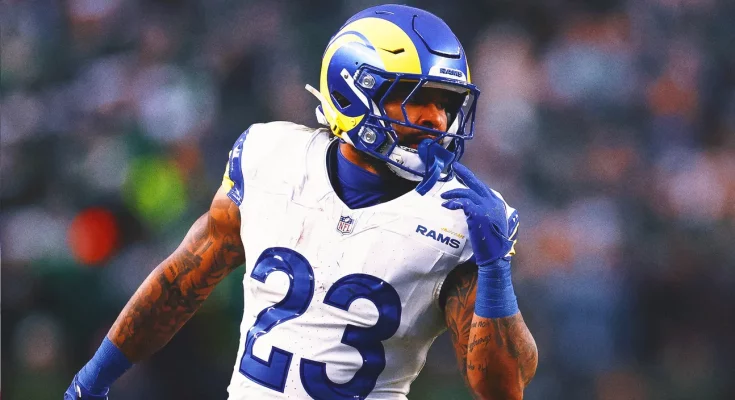Kyren Williams reporting to the Los Angeles Rams’ training camp this week, while simultaneously beginning negotiations on a new contract, signals a crucial inflection point in the young running back’s career. It’s not just about on-field performance anymore; it’s about leverage, timing, and the evolving value of running backs in a pass-happy NFL. For Williams, this is both a statement and a strategy—he’s showing up, he’s ready to work, but he also understands his worth and the moment.
The 2025 NFL offseason has already seen a slew of young stars holding out or skipping voluntary workouts in hopes of landing a more lucrative contract. In contrast, Williams is taking a different route—he’s showing up. That decision should not be mistaken for passivity or surrender. On the contrary, it speaks volumes about how he intends to handle his future in a league that has become increasingly skeptical about the long-term financial commitments to running backs. For fans and analysts alike, there’s a lot to learn from his approach.
To understand where Kyren Williams stands now, we need to reflect on how he got here. Drafted in the fifth round out of Notre Dame in 2022, Williams entered the league without the first-round buzz that often accompanies top-tier college backs. Still, he brought with him a tenacity and skill set that impressed the Rams’ coaching staff almost immediately. Injuries hampered his rookie season, but he began flashing glimpses of the type of player he could become—shifty, tough, versatile, and durable when healthy.
Fast forward to the 2023 and 2024 seasons, and Williams blossomed into a legitimate offensive weapon. In 2023, he racked up over 1,000 rushing yards and added value in the passing game with more than 300 receiving yards and several touchdowns. By 2024, he was not just the starting back for Sean McVay’s offense—he was a focal point. His vision, patience, and ability to read blocks have been standout traits, but more importantly, he showcased his resilience. Williams stayed on the field, carried the load when others went down, and earned the trust of quarterback Matthew Stafford and the coaching staff alike.
Now, in 2025, Williams has made it clear: he’s earned a new deal. Yet the path to getting paid isn’t straightforward. The NFL’s current market for running backs is, at best, ambivalent. Teams have grown wary of handing out large, multi-year contracts to backs, even those with elite production. The cautionary tales of Todd Gurley, Ezekiel Elliott, and Le’Veon Bell still haunt general managers, and as a result, most franchises prefer to ride out rookie contracts and then move on. Even stars like Josh Jacobs and Saquon Barkley have had to battle tooth and nail for their paydays—if they get them at all.
So what makes Kyren Williams’ case unique? First, he’s arriving at the negotiation table at the right time. With two full productive seasons under his belt, he’s still only 24 years old. He’s proven his value to the team not just in stat sheets, but in the film room. He picks up blitzes effectively, a crucial trait in McVay’s pass-heavy offense. He runs hard between the tackles and displays outside burst when the scheme calls for it. Most importantly, he rarely puts the ball on the turf—ball security, especially in close games, is non-negotiable for teams like the Rams.
Williams’ decision to report to camp while negotiating a new deal is a move that balances professionalism with pressure. On one hand, it sends the message to the Rams organization that he’s all-in on the team, that he’s not letting contract distractions compromise his preparation. On the other, it keeps the pressure on Rams brass to do the right thing. By showing up, Williams essentially removes the excuse that often accompanies holdouts: that players are being selfish or putting themselves above the team. Instead, he’s reinforcing his leadership and dedication while keeping contract discussions alive in the background.
It’s a tightrope walk, to be sure. One misstep—an injury in training camp or a drop-off in early season production—could hurt his leverage significantly. That’s why some might argue that a hold-in or outright holdout would offer more protection. But Williams is betting on himself, a bold move that could pay off handsomely if he continues to deliver.
The Rams, for their part, face a bit of a conundrum. They know what Williams means to their offense. With uncertainty surrounding their depth chart and questions about how to best support Matthew Stafford in what could be the twilight of his career, Williams offers both stability and explosiveness. At the same time, the Rams have long been a franchise that plays the long game with contracts, often preferring flexibility over loyalty when it comes to non-quarterback positions.
The question then becomes: what does a fair contract look like for Kyren Williams? For context, the top of the running back market remains relatively flat. Christian McCaffrey, with his dual-threat prowess, remains the gold standard at around \$16 million per year. After that, a steep drop-off ensues, with backs like Alvin Kamara and Derrick Henry sitting in the \$12-13 million range. Realistically, Williams isn’t going to command top-of-the-market money. But a deal in the \$8-10 million per year range, perhaps over three years with solid guarantees, could be a win-win for both sides.
Guarantees, of course, are the sticking point. NFL contracts are infamously light on guarantees, and running backs often see even less than their positional peers. If Williams is going to accept something less than elite AAV, he’ll likely want meaningful guarantees that give him security beyond 2025. From a team-building perspective, locking up Williams now, before his price potentially increases, could be a savvy move by the Rams. The cost of replacing him with someone of equal production—either through the draft or free agency—could end up being more than just cap space. It could cost them cohesion, chemistry, and reliability.
One factor that may tip the scale in Williams’ favor is his fit within Sean McVay’s system. McVay’s offense thrives on timing, precision, and rhythm. Having a back like Williams who knows the nuances of the scheme, understands protection assignments, and doesn’t need a ramp-up period to get in sync with the quarterback is invaluable. Rookie backs, no matter how talented, often struggle with the mental side of the game in their first year. The Rams have invested a lot of time in developing Williams, and now it’s time to decide whether that investment should continue to pay dividends—or be cut short.
From a fan perspective, Kyren Williams has become a beloved figure in Los Angeles. His blue-collar approach, willingness to do the dirty work, and consistent effort have endeared him to Rams Nation. This isn’t a flash-in-the-pan story. It’s the rise of a player who, despite not being a five-star recruit or first-round pick, has earned his way into the spotlight. That’s the kind of story fans root for—and the kind of player organizations often regret letting go.
As negotiations continue, both sides would do well to keep that in mind. Williams isn’t just another running back. He’s a culture guy. He embodies the kind of character and commitment that coaches dream of. Paying him isn’t just about rewarding past performance; it’s about investing in the kind of player who elevates everyone around him.
The timing is also important from a broader organizational standpoint. The Rams are in a transitional window. With Stafford nearing the end of his career and a young core beginning to emerge on both sides of the ball, having someone like Williams as a bridge between eras could be immensely valuable. He knows the veteran standard but is young enough to grow with the next generation of Rams stars. That kind of continuity is hard to find—and even harder to replace.
Williams’ representation, no doubt, understands all of this. They’ll push for a contract that reflects both his value and the risk he takes every time he touches the ball. And the Rams, if they’re paying attention to what their offense needs most, should recognize that letting him walk—or stringing him along—could have ripple effects that go far beyond one position.
For young players around the league, Williams’ case is an instructive one. It shows that there’s more than one way to navigate contract negotiations. It’s not always about holding out or airing grievances through the media. Sometimes, showing up and showing out—while quietly applying pressure behind closed doors—is the most powerful move a player can make.
As the week unfolds and training camp intensifies, all eyes will be on Williams. Every rep, every run, every interaction with coaches and teammates will be scrutinized. But behind the scenes, conversations will continue. Numbers will be exchanged. Proposals will be revised. And at some point, the Rams will have to decide whether they want to reward one of their most valuable players—or risk alienating a cornerstone of their offense.
The outcome of these negotiations could very well set the tone for the Rams’ season. Pay Williams now, and the team sends a message that performance is rewarded and loyalty matters. Drag things out or undercut his value, and the team could be facing not only a disgruntled star but a fractured locker room. In the delicate ecosystem of NFL team dynamics, those decisions matter. Culture isn’t just built on slogans or speeches—it’s built on how organizations treat their players when it counts.
So while the headline may read that Kyren Williams has reported to camp, the real story is far more layered. It’s about value. It’s about timing. It’s about the modern NFL’s complicated relationship with the running back position. But most of all, it’s about a young man who has earned his place and now wants to be compensated accordingly.
For now, Williams will put his helmet on, lace up his cleats, and get to work. But make no mistake—every stride he takes on that practice field is a step toward proving why the Rams should make his contract a priority. Whether or not they heed that message will determine not only Williams’ future—but possibly the future trajectory of their offense as well.



